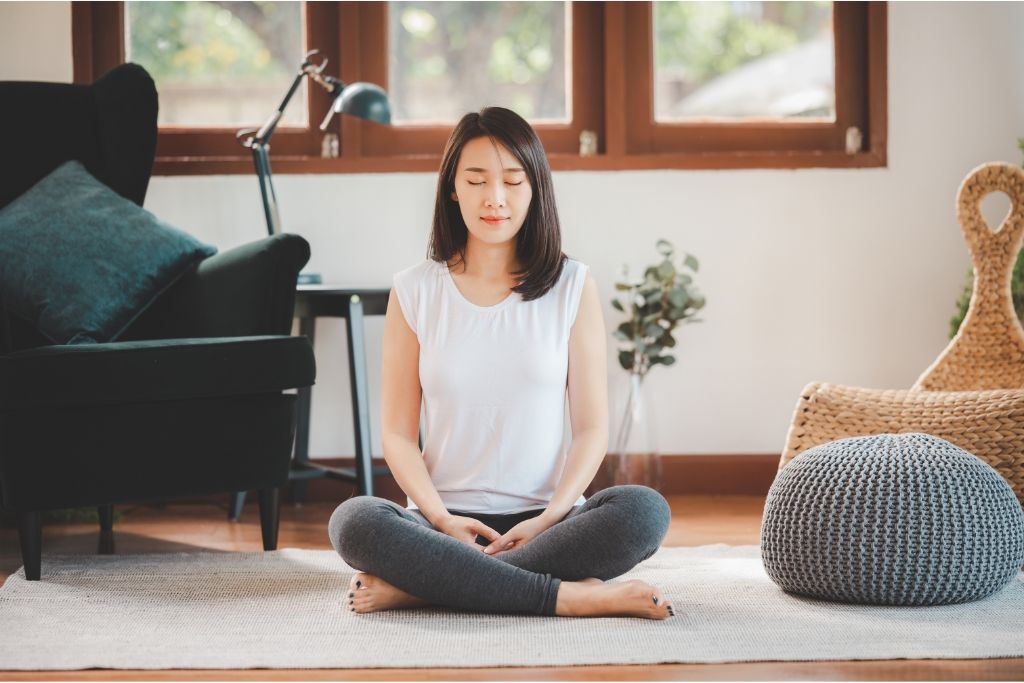In today's fast-paced world, stress and anxiety have become commonplace.
Globally, anxiety is the top mental health disorder affecting more than 284 million people, according to the World Health Organization.
Long working hours, unrealistic deadlines, financial pressures, and the current pandemic have only exacerbated the problem.
While stress might be an unavoidable aspect of modern life, we can learn ways to manage it better.
Meditation is one such way.
Practicing meditation regularly, even for just a few minutes a day, can help us alleviate stress and find calm.
In this article, we highlight 10 meditation tips from experts that can help you achieve stress relief and improve your overall well-being.
1)) Set Aside A Specific Time For Your Meditation Practice
One of the most essential things for successful meditation is consistency.
Setting aside a specific time every day to meditate can help you stick to your practice and make it a habit.
Choose a time when you're alert and can focus, and try to stick to that schedule as much as possible.
2)) Create A Dedicated Meditation Space
A quiet and peaceful space can help create the right atmosphere for meditation.
Designate a space at home for your practice and make it as comfortable and serene as you can.
Use a meditation cushion or a yoga mat, aromatherapy candles or essential oils, and soothing decor to make it a space where you can feel relaxed and at ease.
3)) Start With Simple Breathing Techniques
If you're new to meditation, starting with simple breathing techniques can help ease you into the practice.
The "4-7-8" technique involves inhaling for four seconds, holding your breath for seven seconds, and exhaling for eight seconds.
Repeat the cycle for a few minutes, focusing on your breath and letting your mind wander.
4)) Use Guided Meditation
Guided meditations can be useful, especially for beginners who find it challenging to clear their minds.
There are numerous meditation apps, YouTube videos, and online courses that offer guided meditations on various themes like stress relief, anxiety, sleep, and more.
5)) Focus On The Present Moment
The essence of meditation is to bring your mind back to the present moment and let go of past regrets and future worries.
Try to focus on your breath, bodily sensations, or sounds around you while meditating.
If your mind wanders, gently bring it back to the present moment without judgment.
6)) Experiment With Different Types Of Meditation
There's no one-size-fits-all approach to meditation. Experiment with different types like mindfulness meditation, loving-kindness meditation, or transcendental meditation, and find what works best for you.
Examples Of Different Types Of Meditation:
- Mindfulness Meditation: Focus on your thoughts and sensations without judgment. This practice helps increase awareness and presence.
- Loving-Kindness Meditation: Cultivate feelings of compassion and love towards yourself and others by repeating positive affirmations.
- Transcendental Meditation: Use a mantra or simple sound to bring your mind into a state of restful alertness.
- Body Scan Meditation: Progressively relax each part of your body, starting from your toes and working your way up to your head.
- Zazen (Zen Meditation): Sit in a specific posture and focus on your breath and the moment, often practiced within the Zen Buddhist tradition.
Exploring different types of meditation allows you to find the method that best fits your lifestyle and preferences.
Each meditation style offers unique benefits and can help deepen your practice.
By experimenting and being open to various approaches, you can create a personalized meditation routine that supports your journey toward inner peace and stress relief.
7)) Incorporate Meditation Into Your Daily Routine
You don't have to sit cross-legged for an hour to meditate.
You can incorporate mindfulness into everyday activities like cooking, cleaning, or walking.
Focusing on your breath and the present moment while doing mundane tasks can help you feel more grounded and relaxed.
Example: Mindful Morning Routine
Starting your day with a mindful morning routine can set a positive tone for the rest of the day.
For instance, you could begin with a few deep breaths before getting out of bed, focusing on the sensation of your breath filling your lungs and the feeling of calm it brings.
While brushing your teeth, pay attention to the sound of the water, the sensation of the toothbrush on your gums, and the taste of the toothpaste.
As you eat breakfast, take a moment to appreciate the textures, colors, and flavors of your food, chewing slowly and savoring each bite.
These small, mindful practices can transform routine activities into opportunities for meditation, helping you start your day with clarity and calm.
Incorporating meditation into your daily routine doesn't require extensive time or effort but can significantly enhance your overall sense of well-being.
By weaving mindfulness into simple daily activities, you can cultivate a consistent practice that promotes relaxation and mental clarity, making each moment an opportunity for inner peace.
8)) Practice Self-Compassion
Don't be harsh on yourself if you find it hard to meditate or if your mind wanders.
Self-compassion and kindness are essential elements of meditation.
Acknowledge your thoughts without judgment, gently refocus, and continue your practice.
9)) Be Patient
Meditation is a skill that takes time and effort to master. Don't expect immediate results or stress relief after a few days of practice.
Be patient and persistent, and you'll begin to see changes in your mental well-being, focus, and productivity over time.
Tips for Cultivating Patience in Meditation:
- Set Realistic Expectations: Understand that meditation is a gradual process. Start with short sessions and gradually increase the duration as you become more comfortable with the practice.
- Celebrate Small Wins: Acknowledge and celebrate small milestones, such as feeling more relaxed after a session or noticing a reduced stress level. This can motivate you to continue your practice.
- Practice Regularly: Consistency is key in meditation. Establish a regular schedule, even if it means meditating for just a few minutes each day, to cultivate patience and see long-term benefits.
Being patient with your meditation practice can lead to profound and lasting benefits.
As you cultivate this important skill, you'll find that your ability to remain calm and focused improves over time.
By setting realistic expectations, celebrating small achievements, and maintaining regular practice, you can develop a more resilient mindset and experience greater mental clarity and emotional stability.
10)) Seek Guidance From Experts
If you're finding it hard to meditate or want to deepen your practice, seek guidance from experts.
Look for local meditation centers, workshops, or retreats that offer personalized support and a space to connect with like-minded individuals.
Conclusion
Meditation can transform your life by enhancing your mental, emotional, and physical well-being.
While the journey may require diligence and patience, the rewards are profound and lasting.
By incorporating the various types of meditation, weaving mindfulness into daily routines, and practicing self-compassion and patience, you set the stage for a fulfilling and balanced life.
Seek guidance if needed, and remember that every moment spent meditating contributes to your overall growth.
Embrace the process, and allow meditation to guide you toward greater peace and clarity in your daily life.
Related Articles and Guides
- How To Meditate For Anxiety To Find Calm
- How To Meditate To Relax Instantly
- How To Meditate For Sleep To Improve Restfulness
Download Our Free E-book!







